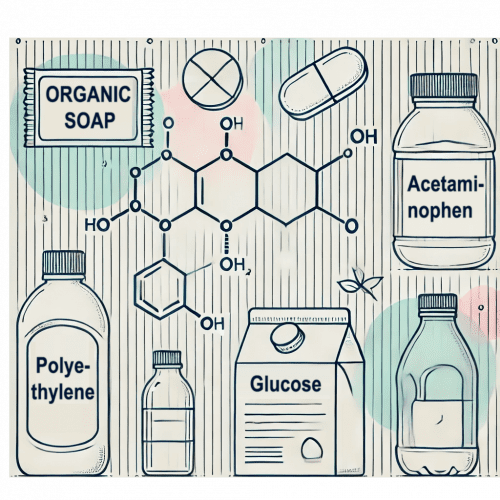Organic chemistry is the study of the structure, properties, and reactions of organic compounds. These are compounds made up of carbon atoms plus hydrogen, oxygen, nitrogen, and other elements. People don’t just study this subject in labs and textbooks; it affects many parts of our daily lives. Organic chemistry is a very important part of everything around us, from the food we eat to the clothes we wear, from the medicines we take to the different things we use in our homes. This article talks about how organic chemistry has a huge effect on our daily lives and why it is so important to modern society.
Organic Chemistry in Food and Nutrition
The food we eat is one of the most direct ways that organic chemistry changes our lives. Proteins, fats, and carbohydrates are all organic compounds. They are the main sources of energy and nutrition. For instance, foods like rice, wheat, and potatoes that are important to many diets are mostly made up of starch, a polysaccharide that the body turns into glucose to make energy.
Proteins, which can be found in fish, meat, eggs, and beans, are made up of organic molecules called amino acids. Proteins like these are needed to build and repair tissues, and they are also very important for metabolism. When we eat, lipids, which include oils, fats, ghee, and butter, are also important organic compounds. They are made up of glycerol and fatty acids and are very important for keeping the body warm and storing energy.
In addition to being important for nutrition, organic chemistry is also very important for making food and keeping it fresh. Herbicides, insecticides, and pesticides are examples of organic compounds that farmers use to keep crops safe from pests and boost crop yields. Also, organic acids like vinegar and food preservatives like sodium benzoate stop microorganisms from growing, which keeps food from going bad. Food colors and artificial sweeteners, which make food look and taste better, are also organic compounds.
Clothing and Shelter: The Contribution of Organic Chemistry
Organic chemistry is very important for making clothes, which is one of the most basic things we need to live. Natural fibers like cotton, wool, and silk are made up of organic compounds, mostly cellulose and structures made of proteins. Cellulose is a polysaccharide that is found in plant cell walls and is what makes cotton and other plant-based fibers what they are.
Natural fibers and man-made fibers like nylon, polyester, and acrylic are both made from organic compounds. Some small organic molecules, called monomers, are chemically joined together to make long chains, which are called polymers. This is how these fibers are made. In the textile industry, these synthetic fibers are popular choices because they last a long time, can be used in many ways, and don’t shrink or wrinkle.
Organic chemistry is also important for building and decorating our homes. A lot of the things that are used to build homes are organic compounds, like wood, plastics, and paints. Plastics are made from synthetic polymers that come from organic compounds like ethylene and propylene. Wood, on the other hand, is mostly made up of cellulose. These things are used to make everything from structural parts to decorative items like furniture, curtains, and even varnishes that keep surfaces safe.
Medicine: Life-Saving Organic Compounds
One of the most important things that organic chemistry has done for people is improve medicine. A lot of the medicines we use to treat illnesses and stay healthy are made from organic compounds. One great example is antibiotics, which have changed medicine by making it possible to treat bacterial infections. Some of these are well-known medicines, like amoxicillin and penicillin.
Organic chemistry has also been very important in the development of medicines that save lives for a wide range of illnesses. Anti-cancer drugs, ulcer medicines, heart medicines, antidepressants, and vitamins are all examples of organic molecules that have made life better and made people live longer. We can now fight diseases that were once thought to be incurable or fatal thanks to the discovery and production of these drugs.
Vitamins and hormones are also organic compounds because they control many biological processes in the body. One example is that Vitamin C (ascorbic acid) is needed for tissues to heal and for enzymes to make certain neurotransmitters. Hormones like insulin, which controls blood sugar, are very important for keeping the metabolism in balance.
Organic Chemistry in Education and Everyday Products
Organic chemistry also has an effect on the field of education. Cellulose is an organic polymer that is used to make paper, which is a basic material for writing and printing. Plastic and other organic materials are often used to make pens and pencils. These are made by organic chemistry. There would be a big difference in the tools and materials used for education and spreading knowledge without these organic compounds.
Organic chemistry is used in a lot of the things we use every day, as well as in school. Products for personal care, like shampoo, soap, and cosmetics, are made up of different organic compounds. For instance, soaps are usually made by saponifying oils and fats with a strong alkali. This creates fatty acid salts, which are what soap uses to clean.
Organic molecules are also found in perfumes, lotions, and makeup, among other things. A lot of the time, organic compounds like esters and alcohols are used to make perfumes, which is why they smell good. Organic surfactants are also used to make everyday items like detergents, which help clean clothes and dishes.
How Polymers Are Used Everywhere
Polymers are everywhere in our daily lives. They are big molecules made up of repeating building blocks. Some examples of synthetic polymers that are used in many different ways are polyethylene, PVC (polyvinyl chloride), melamine, and Teflon. Polyethylene is often used for packaging, PVC for pipes and plumbing, melamine for kitchenware, and Teflon for cookware that doesn’t stick.
People value these polymers because they have special qualities, like being able to bend, last a long time, and not react to chemicals or heat. Because they are so flexible, they are needed in a lot of different situations, from home goods to industrial goods.
In conclusion
Organic chemistry is the basis for many things and processes that make modern life possible. We can’t say enough about how important it is because it affects every part of our daily lives. What we eat, what we wear, the medicines that keep us healthy, and the things that build our homes are all made of organic chemistry. Not only does learning about the role of organic compounds in these different areas show how important chemistry is, but it also shows how chemistry changes the world we live in in amazing ways. Organic chemistry will continue to be at the forefront of scientific and technological progress as we keep coming up with new ideas and making new materials and solutions.







